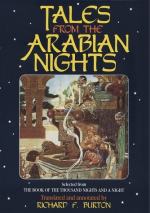one of us aught to be longed for.” Quoth
they jeeringly, “Bring what thou hast of righteous
rede:” so quoth he, “Have you fixed
your intent upon slaying him and robbing his good?”
and they answered, “We have.” However,
he objected again and cried, “Come ye and hear
from me what it is I advise you, albeit I will take
no part[FN#412] in this matter;” presently adding,
“Established is your resolve in this affair,
and ye wot better than I what you are about to do.
But my mind is certified of this much; do ye not transgress
in the matter of his blood and suffer only his crime
be upon you;[FN#413] moreover, if ye desire to lay
hands upon his camels and his moneys and his provisions,
then do ye carry them off and leave him where he lieth;
then if he live, ’twere well, and if he die ’twill
be even better and far better.” “Thy
rede is right and righteous,” they replied.
Accordingly they seized his steed and his habergeon
and his sword and his gear of battle and combat, and
they carried off all he had of money and means, and
placing him naked upon the bare ground they drove
away his camels. Presently asked one of other,
“Whenas we shall reach the tribe what shall
we say to his father and his mother?” “Whatso
Rabi’a shall counsel us,” quoth they, and
quoth Rabi’a, “Tell them, ’We left
not travelling with your son; and, as we fared along,
we lost sight of him and we saw him nowhere until
we came upon him a-swoon and lying on the road senseless:
then we called to him by name but he returned no reply,
and when we shook him with our hands behold, he had
become a dried-up wand. Then seeing him dead
we buried him and brought back to you his good and
his belongings.’” “And if they ask
you,” objected one, “’In what place
did ye bury him and in what land, and is the spot far
or near,’ what shall ye make answer; also if
they say to you, ’Why did ye not bear his corpse
with you,’ what then shall be your reply?”
Rabi’a to this rejoined “Do you say to
them, ’Our strength was weakened and we waxed
feeble from burn of heart and want of water, nor could
we bring his remains with us.’ And if they
ask you, ’Could ye not bear him a-back; nay,
might ye not have carried him upon one of the camels?’
do ye declare that ye could not for two reasons, the
first being that the body was swollen and stinking
from the fiery air, and the second our fear for his
father, lest seeing him rotten he could not endure
the sight and his sorrow be increased for that he
was an only child and his sire hath none other.”
All the men joined in accepting this counsel of Rabi’a,
and each and every exclaimed, “This indeed is
the rede that is most right.” Then they
ceased not wayfaring until they reached the neighbourhood
of the tribe, when they sprang from their steeds and
openly donned black, and they entered the camp showing
the sorest sorrow. Presently they repaired to
the father’s tent, grieving and weeping and
shrieking as they went; and when the Emir Salamah saw
them in this case, crowding together with keening and




